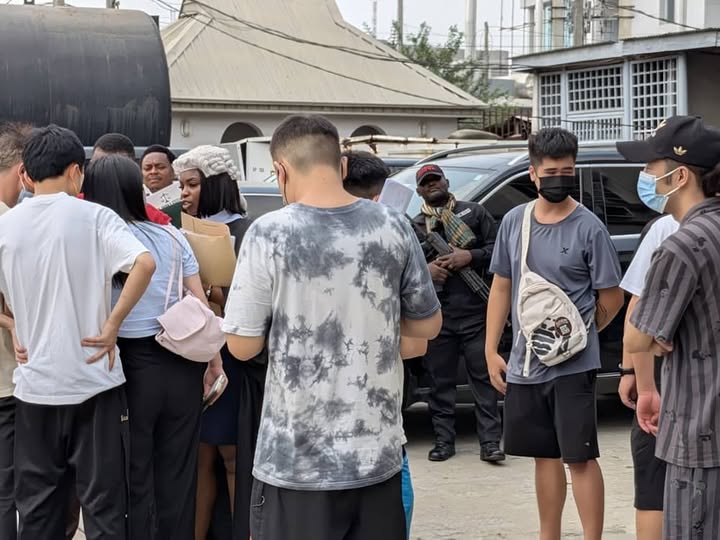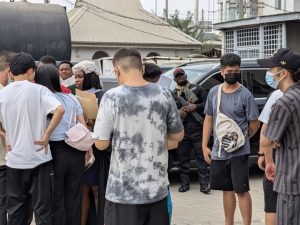
ALLEGED CYBER FRAUD: EFCC WITNESS TESTIFIES ABOUT DISGUISING AS FEMALE TO GAIN CLIENT TRUST

On Friday, February 7, 2025, during the trial of Xiao Hong Will, a Chinese national accused of cyber terrorism and internet fraud, the first prosecution witness, PW1, testified before Justice D.I. Dipeolu of the Federal High Court in Ikoyi, Lagos.
The witness, Rowland Turaki, a cyber security student, revealed that he had been instructed by his employers to present himself as a female in order to gain the trust of clients.
Turaki stated that he was employed by the company of Hong Will, who is facing charges related to cyber terrorism and internet fraud. Hong Will is allegedly part of a group of 792 individuals arrested during the EFCC’s “Eagle Flush Operation” on December 19, 2024, in Lagos for cryptocurrency investment and romance fraud.
He was formally charged with cybercrimes, cyber terrorism, possession of fraudulent documents, identity theft, and other related offenses on January 31, 2025, alongside Genting International Company Limited.
One of the counts reads: “XIAO HONG WILL and GENTING INTERNATIONAL CO. LIMITED, on or about the 18th of December 2024 in Lagos, within the jurisdiction of this Honorable Court, willfully caused to be accessed, computer systems organised to seriously destabilise the constitutional structure of Nigeria (which prohibits and prevents cyber and related crimes) when you procured/employed Nigerian youths for identity theft and to hold themselves out as persons of foreign nationality, with the intent to gain financial advantage for yourselves and you thereby committed an offence contrary to and punishable under Section 18 and 27 of the Cybercrimes (Prohibition, Prevention, Etc) Act, 2015 (As Amended, 2024).”
He pleaded “not guilty” to the charges when they were presented to him.
During Friday’s court session, prosecution lawyer Bilkisu Buhari informed the court that the prosecution’s witnesses were present and ready to proceed with the trial.
However, the defendant’s attorney, B.A. Omateno, told the court that the case was complex and she might not be able to continue with the cross-examination.
In response, Justice Dipeolu ruled that the defense counsel’s argument was insufficient to halt the proceedings.
As a result, Turaki, under the guidance of the prosecution, began his testimony. He explained, “I met him at the office, where we work. He is one of our employers. In mid-November, I was browsing Jiji.ng for a laptop for my cybersecurity studies when I came across an advertisement for a Customer Service representative job with a salary of 250k. I clicked the ad, which directed me to a page with a WhatsApp number to message. After messaging, I was added to the group.”
“On the group, we were given an address and time to come in for the interview. I went to the address at 7, Oyin Jolayemi in Victoria Island, Lagos for the interview. I was tested for my typing skills and not for my computer proficiency skills. The test was to beat a 30-word mark in one minute; and if that’s done, you are hired.
“I expected follow-up questions, but there was none. I was told to resume the next day and I was informed of the rules and regulations of the company. I was also told of the salary structure as well as accommodation and transportation arrangement. I went back home and packed my stuff to resume at work the next day.
In his further testimony, he said: “On getting to work, I was given a script and some information needed as a guideline for my role in the company. My employers told me I had to memorise all that I was given as a guideline for my new role. For the next three days, I was made to study the script, which I will use to speak to clients.
“I was given a chat template; a set of instructions containing conversation between Genting International Company Ltd. and a client. The chat was basically befriending the client and gaining the client’s trust. A roadmap of how the chat will go and what to say.
“I was to present myself as a woman to gain the client’s trust. I was told not to deviate from the template and adhere strictly to it. After three days of training, they provided me with a desktop computer. We were given numbers to contact. We had a time duration of five days to gain the client’s trust, using the template provided. I started chatting with multiple people , mostly men from European countries. I spent about three weeks at the company. I had not gotten the company the number of clients required and I was pressured for it. We were given deadlines and threats of sacking without pay and there were fines. Because of this, I decided to leave the company and when I told my superiors that I wanted to resign, a memo was passed around that if you want to leave you have to give 15 days notice; otherwise, you will leave without getting a dime.
He also informed the court that the company provided them with a model, whose role was to supply pictures and videos, ensuring that if they had to conduct video calls with clients, it would appear authentic.
According to him , “The name of the model assigned to me is Amity Smith. The job of the model was to gain complete trust of the client. Once this has been done, and trust gained, my employers will send a message on the telegram group and tell us to hand off and they take over from us. We stop chatting with the client and move on to the next. Our supervisors are Chinese. I received payment for the duration of my stay, via a bank transfer.
“My employer had armed police presence in the work and accommodation premises. Based on the pressure from my employers, I didn’t think it was wise to flee given the high level of security presence at the premises and I wanted to get paid.
“I wanted to get medication at a time, but the Chinese people told the security men not to let us go.
“When they saw that we were creating a scene, they told the security men to forcefully send us back. We were mostly youths of age 20 to 30. They threatened us and it contributed to my decision to leave. Unfortunately, the EFCC arrested us before I could do that.”
The case was postponed to March 18, 2025, for the continuation of the trial.
